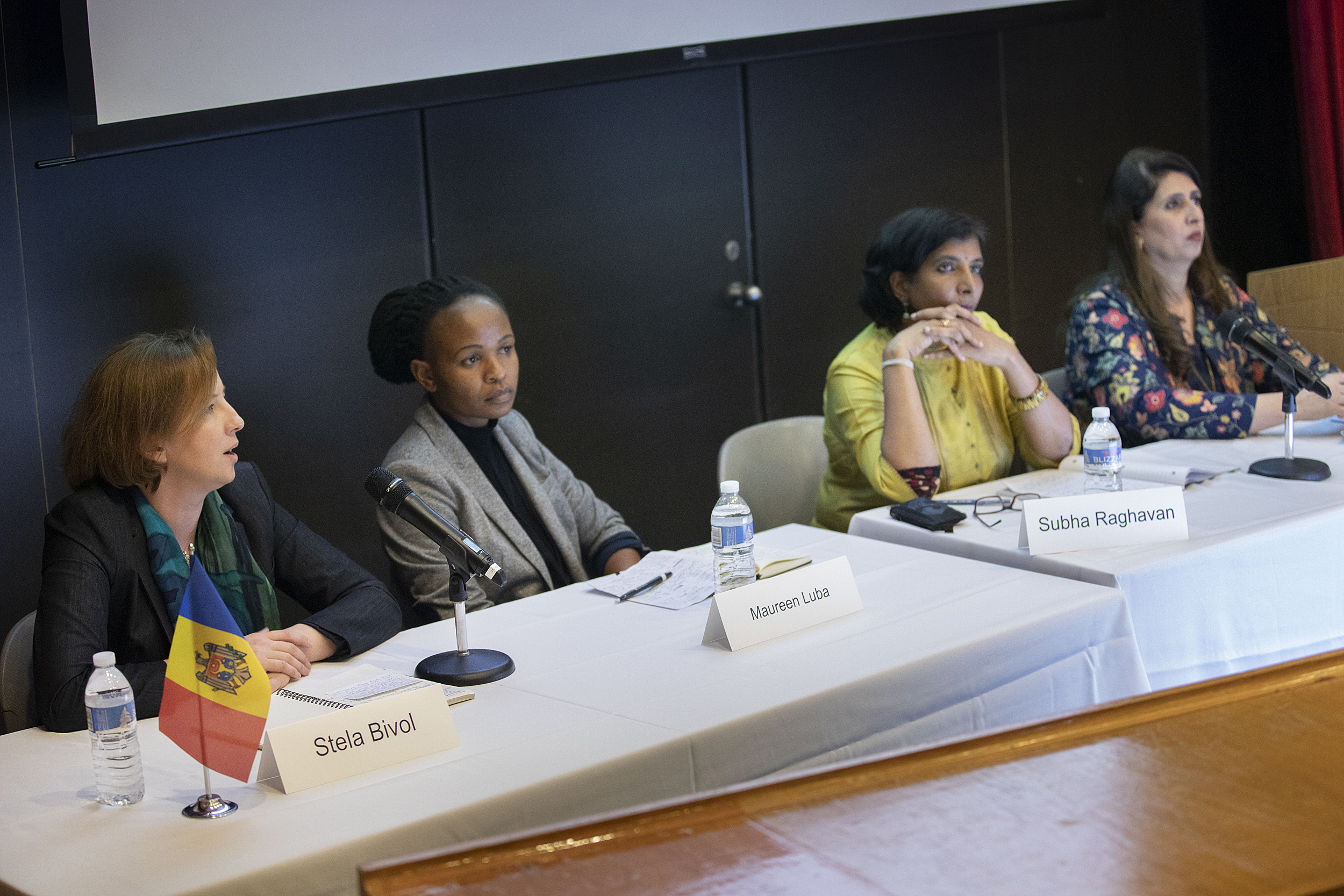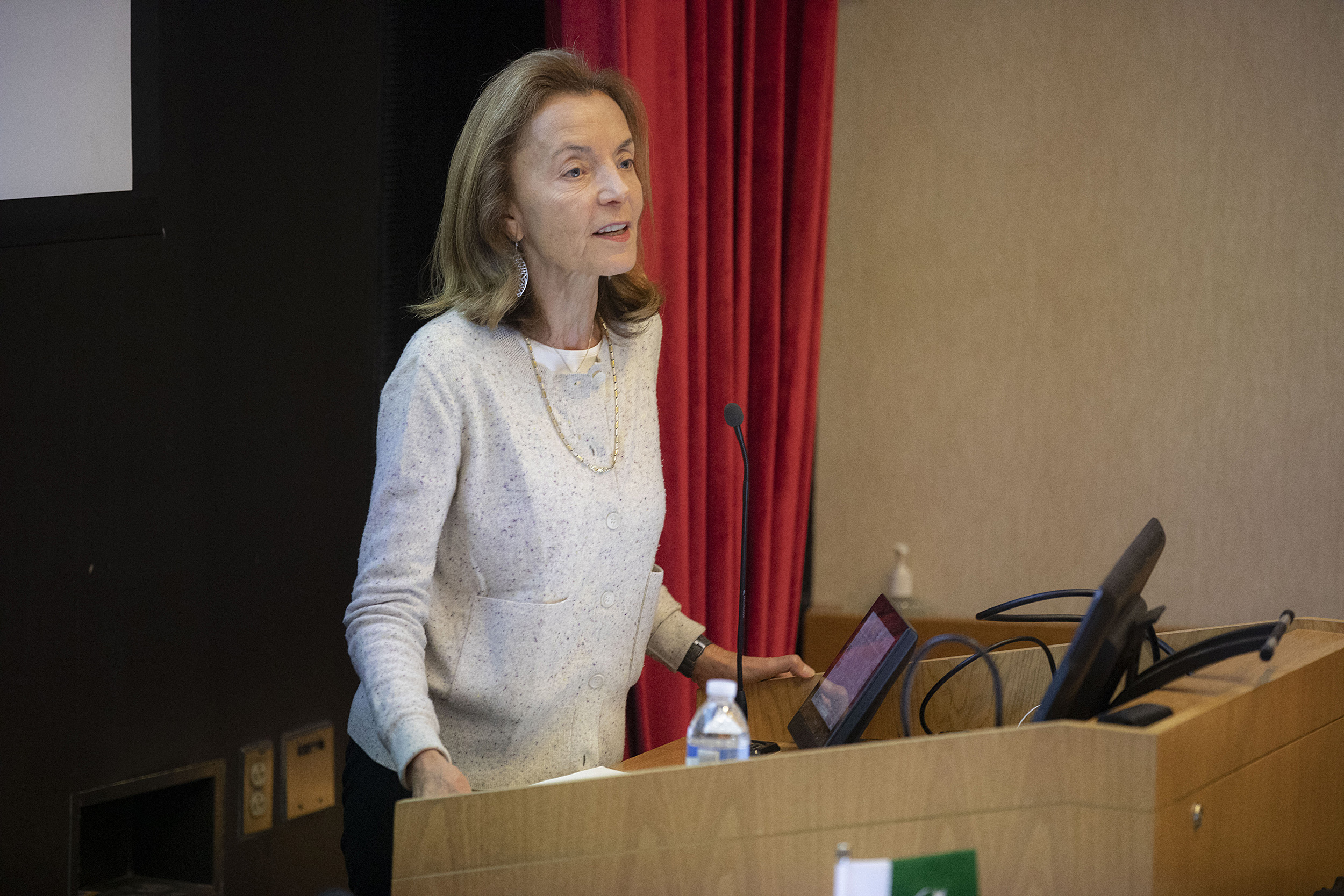
Panelists Stela Bivol, (from left) Maureen Luba, Sai Subhasree Raghavan, and Shabnum Sarfraz, discuss four ways to make a difference in global health.
Photos by Kris Snibbe/Harvard Staff Photographer
Bringing women to the forefront of global health
Worldwide Week panel examines how to keep pushing for gender equity
They want to be in the room where things happen, and they want other women there with them.
That was the overarching message from a four-person panel of female health professionals at Harvard. “Women in the Global Health Workforce” focused on the need to keep pushing for gender equity and empowering female leaders —and data from bodies like the World Health Organization and Women in Global Health show there is a ways to go on that road. Women currently account for around 70 percent of the global health workforce but hold only about 25 percent of its leadership positions, they found.
“The bottom line is that women play an incredibly important role in the health care workforce and in the health system, but very often their contributions represent an invisible subsidy to the health system because they are not fully recognized, they are underpaid, they are not paid at all, and they are not represented in decision-making bodies,” said Ana Langer, professor of the practice of public health and coordinator of the Dean’s Special Initiative on Women and Health, during her opening remarks.
Langer said that in response, the Global Health Institute and the Women and Health Initiative this year created the Jane Jie Sun Women in Global Health LEAD Fellowship —named after its leading supporter, the CEO of international travel agency Ctrip.com —for rising female leaders from low- and middle-income countries. Four fellows were chosen for the two-year leadership program from among more than 300 applicants from 29 nations.
Panelist Shabnum Sarfraz, a former chief executive for a public health agency from Pakistan, told how in her 15-year-career male bosses would often took credit for her work. “It happened once, it happened twice, it happened until I decided, ‘No more,’ ” she said. “That was a defining moment for me because it pushed me to take up leadership roles, roles that I had been actively supporting or doing behind closed doors.”


Professor of the Practice of Public Health and Coordinator of the Dean’s Special Initiative on Women and Health Ana Langer speaks to audience members before the panel discussion.
Stela Bivol, the director of the Center for Health Policy and Studies, a nonprofit focused on disease response and health systems strengthening in Eastern Europe, said that even in countries that have made serious gains in gender equity, it’s important to keep pushing for continued progress and combat the negative responses women often face as they get ahead.
“In terms of social representations, we are better off than many other places, but there are many other challenges,” Bivol said of Moldova, where the last five health ministers were women and more than half of hospital management professionals are female. “One thing that I wanted to say about the story of women like me in the country, in my social network, is [that] a lot of women who have good education and have achieved certain positions have an issue: getting married or staying married.”
Another common thread among the panelists was the role mentors played in setting them up for success, especially when it came to navigating the workforce and asking for what they needed in largely patriarchal countries.
“You have to negotiate your role with your father to give you an equal opportunity for education as your brother,” Sarfraz said. “Then you have to negotiate with your husband as you want to work and raise your children —so you have to negotiate your time. You have to negotiate with your boss. That negotiation always is there.
“It happened once, it happened twice, it happened until I decided, ‘No more.’ That was a defining moment for me because it pushed me to take up leadership roles, roles that I had been actively supporting or doing behind closed doors.”
Shabnum Sarfraz
“It’s not about just opening the job to people,” she said. “You have to provide them with a conducive environment, and women have very different requirements.”
On the other side of mentorship, Sai Subhasree Raghavan, the founding president of Solidarity and Action Against the HIV Infection in India (SAATHII), said women who are used to having men being put before them need help to overcome imposter syndrome. “Many women do not think they deserve to be in leadership and they don’t believe they can be good leaders and they don’t believe they can overcome it,” she said. To counter this, she said, they must be taught to be secure and confident in themselves and their own abilities.
That may include having the confidence to walk away, said Maureen Luba, an award-winning youth and reproductive health advocate from Malawi and one of the inaugural cohort of Women in Global Health LEAD fellows. After her boss told her she was coming off as too aggressive in meetings with prominent men from other organizations, she read between the lines and knew it was because she was a woman. “I knew I couldn’t just continue. I had to do something,” Luba said. “So, I had to make a tough decision. I had to leave.”
Looking back, she knows it was the right choice. “I don’t think I would be where I am right now,” she said.
The discussion was hosted by the Harvard Global Health Institute and the Women and Health Initiative at the Harvard T.H. Chan School of Public Health as part of Worldwide Week at Harvard.








